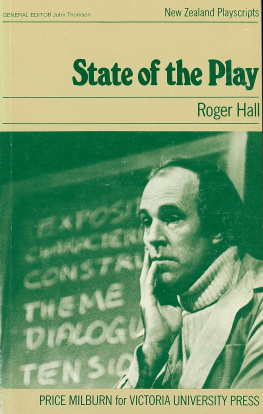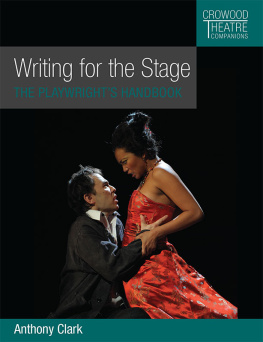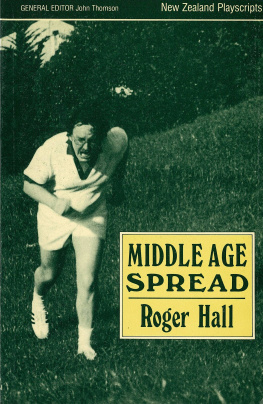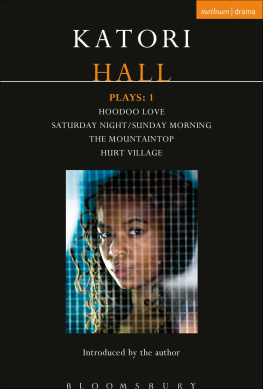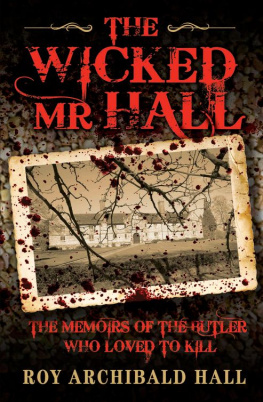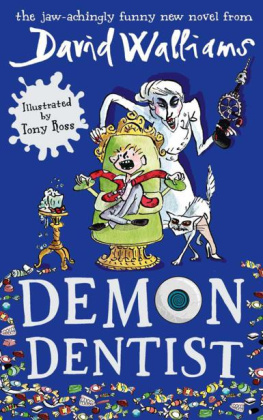STATE OF THE PLAY was first presented by Downstage Theatre, Wellington, on 8 June 1978 with the following cast:
PETER DINGWALL Peter Vere-Jones
DAVE HEDGES Ray Henwood
CLARE WATSON Penny Downie
MARGARET JENNER Anne Budd
BRIAN MARSHALL Stephen Gledhill
NEIL PETERSON Michael McGrath
Directed by Anthony Taylor
Set designed by Paul Shirriffs
Costumes designed by Trish Tennent
Lighting designed by Malcolm Savage
PETER DINGWALL . Forty-five to fifty-five. He was once a successful playwright, but hasnt written anything for some years. He runs the weekend course with very little enthusiasm, having done it too many other times to expect anything fresh to emerge.
DAVE HEDGES. In his fifties. A secondary school teacher of English. He loves the subject but is unable to convey this love to his pupils. He is on the verge of giving up caring, and his clothes indicate that he no longer pays much attention to his appearance.
CLARE WATSON. Twenty-five to thirty-five. She is an attractive, smartly dressed housewife, ambitious for social as much as for artistic reasons.
MARGARET JENNER. Thirty-five. Polio, from which she suffered twenty years previously, has left her in a wheel chair, but she still leads an active life and has a great many interests.
BRIAN MARSHALL. Thirties to forties. He is a smartly dressed dentist. His weak jokes quickly become infuriating, but reproof makes him sulk.
NEIL PETERSON. Twenty or twenty-two. He dresses in rather striking clothes, including a long scarf. Being both sensitive and knowledgeable about theatre, he quickly senses Dingwalls weariness, and for the most part is cynical about the weekend course.
Music:DanHills Sometimes When We Touch.
Friday evening.
The classroom of a secondary school in a small town. On the walls are posters of Jane Austen, Trollope, Oscar Wilde, Shaw, Keats and Dickens. Each poster shows a picture with a descriptive text underneath. The classroom desks are arranged roughly in rows but many are askew. Near the teachers desk is a mat with a paper dart lying on it. Fixed to the wall is a blackboard with some set work in English on it. PLEASE LEAVE is written beside it. In one corner is a record player.
PETER DINGWALL enters,turnsonthelightandmovestotheteachersdesk.Helooksaroundtheroomwithanoticeablelackofenthusiasm.Findingsomechalk,hebeginstowriteuponaneaselblackboardalistoftopics:
Exposition
Characterisation
Construction
Theme
Dialogue
DAVE enters.Heisinhisfifties,dressedinanoldsportscoatandcorduroysamanwhodoesnttakemuchcarewithhisappearance.Helookswellworn,andisnowbothslightlyharrassedandembarrassed.
DAVE : Got everything you want?
DINGWALL : Seem to have.
DAVE starts to stack and arrange desks and chairs.
DAVE : The others wont be long. I said seven prompt.
DINGWALL : How many signed up?
DAVE doesnt answer for a moment. He then sees DINGWALL is still waiting.
DAVE : Embarrassed. Four.
DINGWALL : Four!
DAVE : Five. Er look, Im not sure I did the right thing. I er enrolled myselfto make up the minimum number. On reflection, you might have preferred me to wipe it altogether.
DINGWALL: Four!
DAVE: I thought thered be a lot more. With your name and everything.
DINGWALL : Tch, thats showbiz.
DAVE begins arranging five desks and chairs.
DAVE : Im sorry if youd rather have cancelled it I didnt know what to do.
DINGWALL: Doesnt matter. Its the last time Ill be doing this anyway.
DAVE : Is it?
DINGWALL : Probably.
By now DINGWALL has added to his list on the board:
Tension
The dramatic entrance
Climax
When he has finished, he stands back and notices a paper dart at his feet. He picks it up, unfolds it and reads whats on it.
DINGWALL: Whos Pisspot?
DAVE stops and stares at him,wondering where theinformation came from; then he sees the dart and understands. He shrugs, and carries on setting out the desks.
DINGWALL : So youre not in the budding playwright category?
DAVE : No.
DINGWALL: Well, its never too late. Neither Shaw nor Chekhov wrote their first play till they were thirty-six.
DAVE: I know.
DINGWALL : So you never know.
DAVE: Thirty-six. Keats had been dead for ten years. Ill go and get the roll.
DAVE goes out. DINGWALL gets out a whole lot of notes from his briefcase and dumps them on the teachers desk. He looks at them and sighs. He sits down at one of the desks, CLARE enters. She is an attractive woman in her late twenties or early thirties. She is well dressed, slightly better dressed, in fact, than the occasion demands.
CLARE : I know youre Peter Dingwall, so this must be the right place. Im Clare Watson.
DINGWALL : Gettingtohisfeet. How do you do?
CLARE : Lookingroundtheroom. Still killing kids interest in literature for life, I see.
DINGWALL : Somebody has to do it.
CLARE gets out a cigarette, then offers DINGWALL one.
DINGWALL : Thanks. Shelightshiscigarette. Thanks.
CLARE : Ive enjoyed your plays. Over the years.
DINGWALL : Thank you.
CLARE: Its a long time since the last oneits time you wrote another.
DINGWALL : So Im told.
CLARE : Is there another on the way?
DINGWALL : Oh theres always another one on the way.
CLARE : You sound like a Catholic housewife. It must be a marvellous life, writing. Doing what you want. Meeting people. Travel.
DINGWALL: Utter loneliness while you work. Weekends in places like this, CLARE isabithurtbythelastcomment.
She moves off to walk around.
DINGWALL : And what brings you to this course?
CLARE : Withashrug. Interest. Shepeersatthedeskandreadsthegraffiti. Only 365 days till this time next year. Id like to write a play of course.
DINGWALL : Every housewifes dream. Once theyve realised the dwindling market for short stories and had half a dozen poems rejected. Readsfromthedesk. Help stamp out quicksands. Mm, makes a change from the usual rampant peni.

